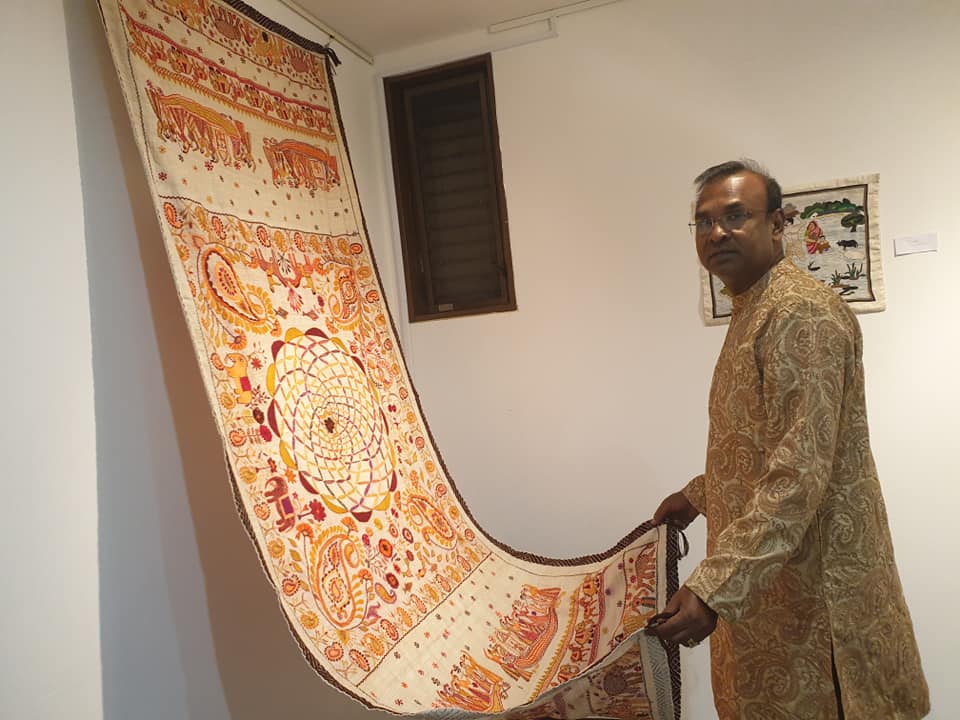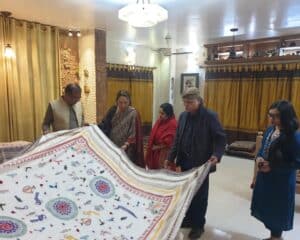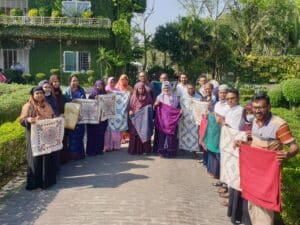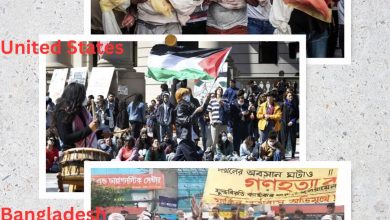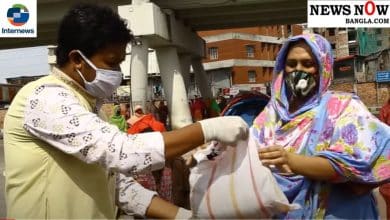For centuries, women have been telling stories through art and music. In Bengal, these stories are told through Nakshi Kantha, a type of folk art where colorful patterns and designs are embroidered into a quilt with a running stitch called “kantha stitch”.
Nakshi Kantha tells the story of life in rural Bangladesh. It tells the story of the joys, sorrows and the dreams of the future.
Jasim Uddin’s famous verse narrative, ‘Nakshi Kanthar Maath (The Field of Embroidered Quilt)’, is not a fantasy based in a faraway land. It tells the story of how the women of rural Bengal wove beautiful embroidered quilts for their loved ones. Fond memories of loved ones living in foreign lands were imbued in every weave of the Nakshi Kantha. Many might have unfulfilled wishes of gifting that handwoven Nakshi Kantha to their true love, just like Shaju in the poem.
Now-a-days, In the evolution of time, many traditional things are going lost from society, from the country, and become extinct! But some people still trying to hold on to this tradition with love. Md Aminul Islam of Jhenaidah Shailkupar is one of them. Who saw his mother’s kantha sewing in his childhood and became interested in weaving kantha himself.
As well as being an artist himself, he is also playing a leading role in organizing and crafting artisans from house to house in the village. He has organized needleworkers in different districts of the country.
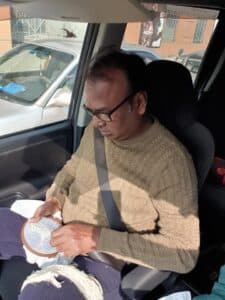
Aminul’s childhood and Nakshi weaving:
Aminul Islam was born in a marginal farming family in Shailkupar, Jhenaidah. Aminul Islam is the youngest of six brothers and one sister. He also became an innate embroiderer after watching his mother sew kantha in his childhood. However, in the rural society of Bangladesh, the interest of a man in these works is looked down upon. So even if he wanted to, he could not use his artistic talents and talents in Jhenaidah.
Meanwhile, despite crossing the boundaries of college, Aminul could not remove himself from nakshi weaving.He was always trying to do something for art and beauty. Sitting in a village in Jhenaidah, there is no opportunity to do other work. And so he moved to Dhaka, the capital of brick, wood and concrete , with thousands of dreams.
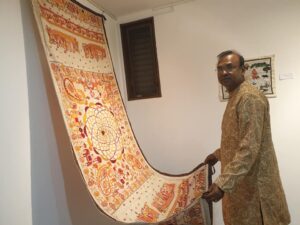
Aminul established in the capital with the work of Nakshi Kantha:
Aminul’s dream and expectation to Go ahead with rural works of art. Aminul’s efforts were to make that dream and expectation a reality. He made that effort a reality by coming to Dhaka.
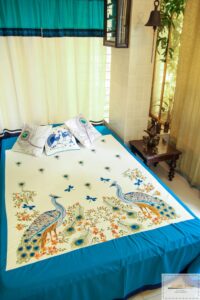
The time is 1990. One day he was fascinated by saw Arang’s showroom. He dreamd, if I had the opportunity to work here! He got the opportunity. He show his handiwork to the Aorang authorities. Seeing Aminul’s own designed Punjabi, shirt and nakshi kantha, he was given the opportunity to work. Since then, he has been working as one of the famous and reliable suppliers or producers of Arang for 32 consecutive years. His skill, hard work, honesty and perseverance brought him to this place.
Aminul’s nakshi project in Jhenaidah :
While working with Arang, Aminul’s dreams get bigger. He always remember his birth place and childhood place Shailkupar , Jhenaidah . And so he would run to the village whenever he got a chance. He wanted to work with rural people. Since that attempt, he has been involved in weaving nakshi kantha with the rural women of Jhenaidah area. As well as being an artist himself, he is also playing a leading role in organizing and crafting artisans from house to house in the village. Apart from his own district, he has a team of such organized embroiderers in different districts of the country.
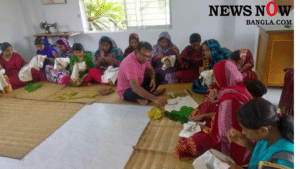
Most of the members of that group are women. In this way, he also provided employment opportunities to the poor women. Again, many people see Aminul’s love for Nakshi Kantha and want to work with interest. With them, Aminul continues to make the nakshi works even bigger. Everyone is sewing nakshikantha, Not that. His main job was to embroider various home decor products including clothes. He has done it responsibly for a long time with his team.
About two and a half thousand members are working in Aminul’s embroidery team:
At one time he used to go from house to house and try to organize craftsmen. Now Aminul is doing various kinds of nakshi weaving with about two and a half thousand needleworkers. Most of them are rural women.
Among them is Shahana Parveen Kona. Kona, a girl from Shailkupa area of Jhenaidah, told to News now Bangla, “I have been working on this nakshi kantha of Aminul Bhai for 22 years. I also design Punjabi and bed sheets. ”
Kona said, “I used to break paddy and make rice. It would have been very difficult. It was very dessicult to maintain our families needs. But I knew how to sew. One day Aminul Bhai told me to work for him and said ” you will do well”. After that I didn’t have to look back, I have been working for him for 22 years. I got married. I still don’t have to rely on my sons and daughters. I’m still doing well on my own. “
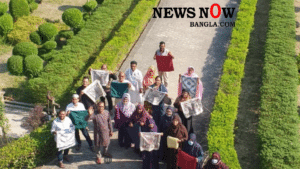
There are also different tastes in the stories of Aminul embroiderers. Talking to a needleworker named Munia. She said, “I have seen Aminul Bhai since my childhood, he loves rural work very much. I liked his work. Seeing his work, I also wanted to do nakshi kantha work. When I told Aminul Bhai one day, he let me to do work. Since then I have been working in his team for about 10 years. Let’s go on our own earnings, and also help in the family. “
Aminul’s work has been praised outside the country:
Aminul said he has traveled to Korea, India, Portugal, Japan and Hong Kong with his work. He Exhibited there with his works. In those places, this industry of Bangladesh has garnered wide acclaim. He got encouragement and courage from them. He came back and started doing more work in a new way.
And Aminul’s brand “Bangla Selay”:
Md. Aminul Islam has been working for a long time with Arang, the country’s top fashion house, as a producer. She has recently created her own brand ‘Bangla Selay’. From here all the unique handicrafts of Aminul Islam will be made. It is still operating as a Facebook-centric organization. He built a factory in Faidabad, south of Dhaka.
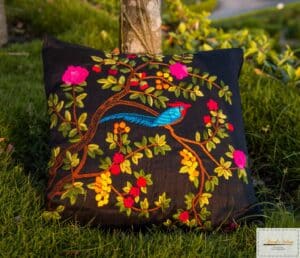
Bengl selay is now making sari, punjabi, fatwa, bed cover, cushion cover, kantha, shawl, curtain of house and many other essential household items. They have their own needlework.
Apart from his district Jhenaidah, he has a large force of about one and a half thousand personnel in Tangail, Rangpur, Narsingdi and other areas. They are the ones who now supply the needlework to Aminul as per the demand. Aminul provides them designs and other accessories as required. They work and send it back to Aminul. Then they reach the buyer on demand.
Future thoughts:
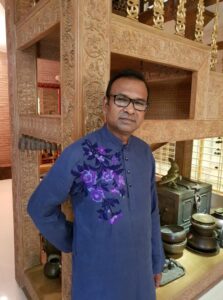
Aminul Islam said, I want to create a showroom called my own brand “Bangla Selay”. In Dhaka, of course, I will gradually do show-rooms in different villages. By doing this, the people of the country will love rural products. Besides, there will be employment opportunities for many more. We are moving forward with “Bangla selay” with that expectation.
